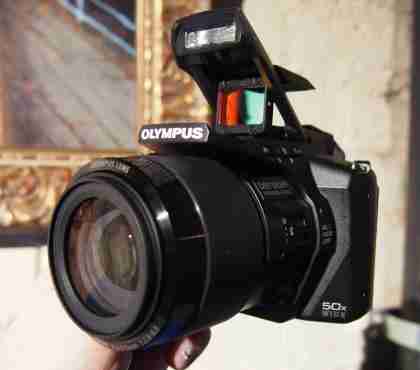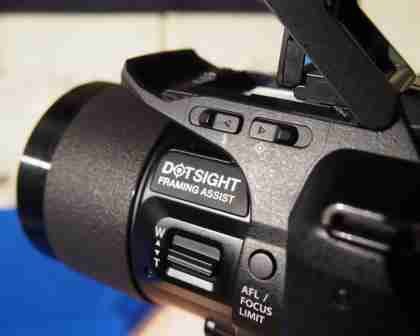If Jean-Claude Van Damme was to buy a camera in 2014 he'd almost certainly buy an Olympus SP-100 Eagle Eyes. Yes, the most interesting camera design of 2014, and certainly the most macho, may already have been clinched by this bridge camera, the first ever to come with a built-in red dot sight.

Yes, you heard right, the optical aiming device most commonly found on top of assault rifles all around the world, has finally made its way to cameras. The Olympus SP-100EE mounts the aiming device just below the pop-up flash. For those who aren't regular Call of Duty players, the advantage of a red dot sight is that the dot stays on what you're pointing the gun at (or camera at in this case) however you may move your head, and you can hold it arm's length and it still works perfectly.

The reason it's been included on this camera is to help you line up shots at extreme zooms, with the SP-100EE having a 50x zoom lens. With such a long zoom it's easy to lose sight of your subject (or should we say target) while zooming in, and then very hard to find it again without having to zoom back out to get a better idea of the surroundings. Trying to pinpoint a moving target in the extreme distance with a typical ultra-zoom, bridge camera can be very testing.

The red dot sight, in our limited time with it, does seem to alleviate the problem. You simply put the crosshairs on the subject and start zooming in, if the subject moves just track it with the sight and you can easily keep it in the shot. Obviously you'll still need to hold the camera still to get a steady shot, but the lens-shift image stabilisation should help here.

The other advantage of a red dot over say a viewfinder, which is also supplied here in the form of a 920k dot EVF, is that you can keep both eyes open while using it, so you get your full peripheral vision while lining up a shot, great if you're edging about in a wood trying to get the best angle through the trees. It should also help you keep on target when shooting video, with 60fps at Full HD on offer.
Other than the sight, the camera is fairly typical high-end bridge fare. The lens stretches from a not very wide 24mm equivalent, right out to a whopping 1200mm at the long end. The long zoom range is courtesy, as usual, of a small 1/2.3in backlit sensor, this has 16 megapixels packed onto it and we'll be interested to see how the TruePic VII image processor deals with the resulting noise. That said, this camera is built to shoot in the great outdoors, so low-light performance isn't that big an issue. The image processor provides shooting at up to 7.1fps, so capturing fast-moving subjects at their best shouldn't be a problem.
It's a genuinely unique proposition and we can't wait to hunt our young'uns through the woods with it when we get our hands on a review sample in the near future. We're still waiting on Olympus to provide us with a UK price, but converting the Euro price we get a fairly substantial £327, which will put it in competition with the likes of the Sony Cyber-Shot DSC-HX300 and the Canon PowerShot SX50 HS or its soon to be announced replacement.
